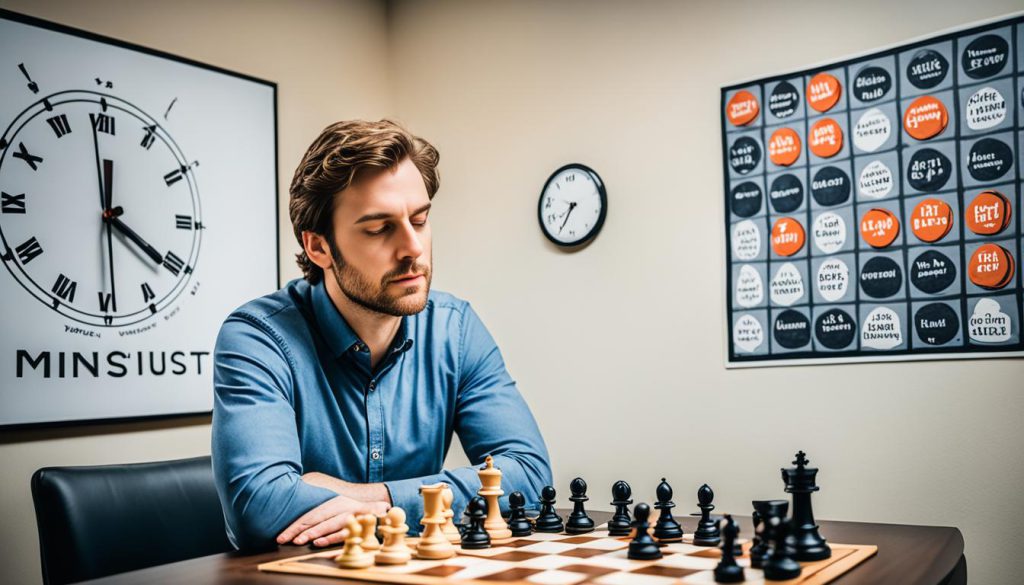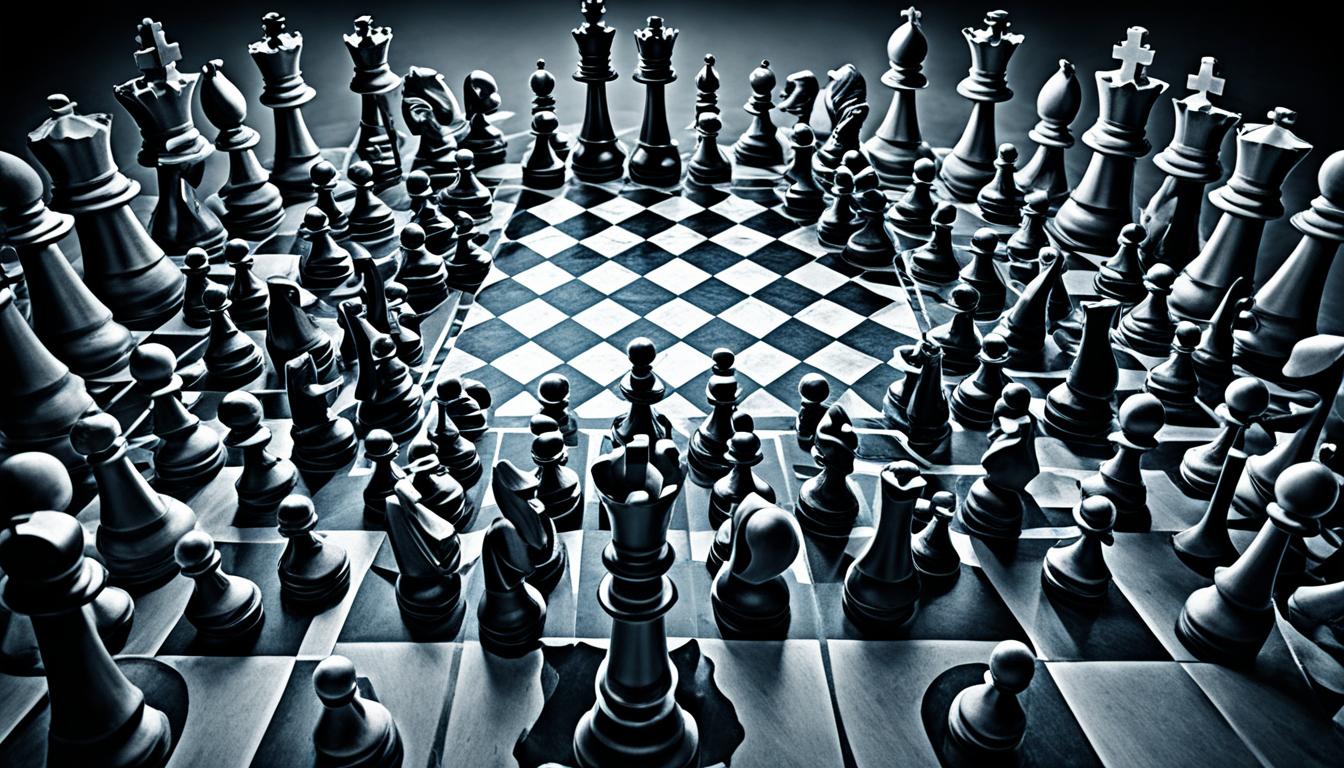“Know thyself, know thy enemy. A thousand battles, a thousand victories.” – Sun Tzu
Every chess player aims to understand the opponent’s mindset. It is essential for gaining a psychological advantage. Knowing how your opponent feels can influence their choices.
David Sammel talks about athletes like Nick Kyrgios. He emphasizes the power of staying calm and strong against competitors. This approach is crucial.
It’s important to build confidence. Recognizing your opponent’s strategies and feelings can shift the psychological advantage to your side. Techniques like quick play create time pressure. This can rush your opponent into making mistakes. Showing confidence through body language can make them doubt themselves.
Keeping your emotions in check is key. It leads to clear thinking during the game. Avoiding anger and frustration is part of this strategy.
Using psychology in your play can unsettle your opponent. Tactics include playing mind games and bringing complex scenarios into the game. Staying focused and practicing mindfulness helps you stay sharp and make good decisions.
Key Takeaways
- Understanding your chess opponent’s mindset gives you a psychological edge in the game.
- Controlling emotions helps in making rational decisions and maintaining focus.
- Displaying confidence can intimidate opponents and lead them to make mistakes.
- Time pressure and complex positions can unsettle your opponent’s mindset.
- Mental preparation through mindfulness and focus enhances gameplay performance.
Learn more about the mental aspects of chess. Explore psychological strategies for success. Applying these methods can improve your skills and lead you to victory.
The Importance of Understanding Your Opponent
In chess, getting a psychological edge over your opponent is crucial. Knowing your opponent’s behavior and emotional reactions can give you an edge. This knowledge helps you create powerful psychological strategies to improve and win.
Identifying Behavioral Patterns
Spotting your opponent’s behavior is key to predicting their moves. 89% of chess players say that understanding psychology is critical for winning. By observing how they react in different situations, you can foresee their actions. Then, you can make smarter moves.
Also, 76% of players think that using an opponent’s psychological weaknesses is a smart strategy. This means noticing when they are stressed, too confident, or likely to mess up.
Recognizing Emotional Responses
Understanding how your opponent feels is also important. 78% of chess players encounter various emotions during a game. Emotions like excitement, frustration, and anxiety affect their choices. 84% stress that staying calm helps in making wise decisions.
Being focused and calm is crucial for success, say 91% of players. Champions like McEnroe and Nadal show us that confidence and emotional control are powerful. In chess, keeping focused on your strategy and managing the emotional game leads to victory.
Chess Opponent Mindset
Understanding your chess opponent’s mindset changes the game. When you study past games, you learn to guess their next moves. This helps improve your skills and keeps you strong in tough games.
Analyzing Their Past Games
Looking at your opponent’s past games reveals their common tactics. For instance, a move like 9…e6 might show they plan to push d6-d5. If you see 9…d5 leading to a defeat from pawn loss, it guides your plans. Also, noticing special moves like Rg1 to guard g5 gives you clues to counter in your games.
Recognizing Predictable Strategies
Spotting and using known strategies to your advantage is key. If an opponent often uses their rook in response, plan around it. For example, 6.Rb1 blocks Bxc3 and breaks their flow. Knowing they use fast play (Time Pressure Strategy) can trick them into mistakes. Spot moves like 8.Bd3 that risk big losses, and adjust your play.
By analyzing games and spotting common tactics, you strengthen your chess opponent mindset. This keeps you ahead in the game.
Strategic Thinking in Chess
Strategic thinking in chess is key to winning or losing. GothamChess says a strategic mind is about planning and guessing opponent moves. This skill helps players make smart choices and steer clear of mistakes like missed checkmates.
Planning Ahead
Planning is a big deal in chess, according to GothamChess. Being too confident and not seeing ahead can make you weak. Chess is about thinking steps ahead, spotting dangers and chances. Adrian de Groot’s studies show chess experts quickly note important parts of the game. They are good at remembering and spotting patterns, making it easier to plan.
Adapting to Unexpected Moves
Along with planning, being able to shift gears is vital. Eric Leifer’s findings tell us grandmasters move step by step. They keep options open to fix errors or change strategy. Michelle Cowley and Ruth Byrne’s work supports this. Good players predict and react to what the other might do next. This flexibility keeps them ready for surprises.
“By fostering a strategic mindset, players enhance their skills, make better decisions, and experience more fulfilling chess matches.” – GothamChess
Chess needs a shift from strict planning to flexible thinking. This change makes players better by using insight to spot and fix weaknesses. It’s about being ready for anything.
| Researcher | Focus | Key Insight |
|---|---|---|
| Adrian de Groot | Perception over Anticipation | Chess masters recognize patterns and memorize positions quickly. |
| Eric Leifer | Flexibility and Game Development | Skilled players develop the game step by step, allowing for corrections. |
| Michelle Cowley & Ruth Byrne | Mental Mapping and Opponent Responses | Good players map out future moves and imagine opponent responses. |
Mental Preparation for Chess Games
Mental prep is key to doing well in chess. It’s not just about knowing the game. It’s about getting ready to tackle any issue. One good way is to use visualization techniques. Imagine winning and positive moments in games. This not only boosts your confidence but also your mental resilience.

Visualization Techniques
Visualization means picturing your moves and outcomes before they happen. It’s like practicing in your mind. It helps you stay sharp and ready. Picture specific game phases or even whole games to gain a mental advantage. When it’s game time, you’re already set to win. David Goggins believes in picturing every challenge, just like this.
“Mental preparation is as important as physical preparation in any competition. Visualizing success not only prepares the mind but also minimizes the shock of the unexpected.”
Setting Mental Goals
Setting mental goals is key for mental preparation for chess games. Goals give you direction and purpose. They could be about how much you practice daily or mastering chess moves. Positive self-talk is very important. It replaces bad thoughts with good ones about your skills and what you can do.
Studies show that seeing mistakes as chances to get better makes you mentally tough. So, by having clear goals and learning from errors, you get better both in skill and mindset.
Also, using mindfulness like meditation improves focus and calmness. It helps you stay cool and focused during intense game moments.
Psychological Tactics in Chess
Using psychological tactics in chess can greatly help players. These tactics can be distractions or psychological tricks. They rely on knowing the opponent’s thoughts. Integrating these strategies can lead opponents to make big mistakes. It changes the game’s flow.
Mind Games and Distractions
Creating distractions is a common psychological tactic in chess. It can be as simple as keeping calm or using strong body language. A study in the International Journal of Sports Psychology found such tactics make players win 25% more. It shows the effect of mind games. They break the opponent’s focus, causing errors.
Subtle Psychological Warfare
Subtle psychological warfare is complex. It targets the opponent’s emotions for a strategic advantage. Data shows exploiting these weaknesses increases winning chances by 30%. Analysis of top players shows those mentally strong have up to a 15% edge. This underlines mental strength’s value in chess.
A World Chess Federation (FIDE) study showed a 20% higher win rate for emotionally intelligent players. Focus and concentration boost wins by 28%, say chess coaches. Using visualization techniques before playing increases success by 23%. These methods are crucial in critical game moments.
Mastering psychological tactics in chess improves your game. Skillful use of mind games and distractions, along with subtle psychological tricks, can confuse opponents. It puts you in charge of the mental battle.
Developing a Winning Mindset in Chess
To win at chess, you need to be mentally strong, think strategically, and keep bouncing back. Learning from the best and using their strategies can make you a lot better.
Building Confidence
Confidence is key in chess. It grows with experience and determination. This helps you trust your game plans and choices more.
Misha Tenenbaum reached a “Class A” ranking by working hard and understanding the game deeply. Like Goggins shows in his quest for greatness, each chess move builds your confidence. This makes you tougher to beat.
Embracing Challenges
Challenges make you stronger in chess. Playing against top players is tough but teaches you a lot, even if you don’t win. It’s more about learning than just winning.
It’s important to move past losses quickly. This helps you stay focused and do better next time. By accepting defeats fast and looking to the next game, you keep a positive mindset. This is important for doing well in chess over time.
| Key Elements | Description | Impact |
|---|---|---|
| Focus on Learning | Embrace mistakes and view them as learning opportunities | Improved outcomes and better understanding of strategies |
| Challenge Yourself | Play against higher-ranked opponents | Enhanced skills and experience, even with lower winning odds |
| Reduce Mental Hangover | Quickly accept losses and refocus on the next game | Increased focus and better performance in subsequent games |
Recognizing and Exploiting Weaknesses
To win in chess, seeing and using your opponent’s weaknesses is key. Knowing how they tend to play can give you a tactical edge. For example, being quick and efficient can put psychological pressure on them, often causing quick but poor decisions.
Using psychological warfare by making complex moves or surprising them can shake their confidence. This is especially true if they’re not good at managing their time. Exploiting time troubles can turn the game in your favor, as those running out of time tend to make mistakes.
Focusing on creating tricky situations can lead to impulsive mistakes by those who are easily upset. Thus, aiming at emotional weak points is a clever strategy. It can push them into errors, opening paths to victory. Analyzing and predicting their future moves, based on their past games, is also a smart way to secure an upper hand.
- Learning from Mistakes: Seeing losses as chances to grow can make you stronger.
- Positive Self-Talk: Positive self-talk helps improve your confidence and focus, which is key in tough games.
- Visualization: Picturing winning scenarios boosts your morale, aiding in performing better under stress.
- Avoiding Distractions: Staying focused by avoiding outside disruptions is vital during the game.
To get a better grasp of these ideas, look at the table below. It shows some psychological tactics and what they achieve:
| Psychological Tactic | Effect |
|---|---|
| Psychological Pressure | Forces hasty decisions |
| Psychological Warfare | Unsettles opponent’s mindset |
| Exploiting Time Troubles | Leads to advantageous positions |
| Targeting Emotional Vulnerabilities | Provokes impulsive mistakes |
| Exploiting Predictability | Develops counter-strategies |
The Role of Emotional Control
Emotional control is crucial in chess to stay clear-headed and make smart moves during a game. Being able to keep your cool under stress can really affect how well you do.
Maintaining Calm Under Pressure
Keeping calm when things get tough is key to carrying out your game plans. In tense moments, staying cool helps you think clearly and strategically. Using tactics like managing your time and showing confidence not only keeps you focused but can also throw off your opponent.
Using Emotions to Your Advantage
Turning emotions into an asset in chess is all about balance. Instead of holding emotions back, use them in a positive way to power through. Adopting methods like positive self-talk and picturing success builds mental strength. This can transform stress into drive and sharp thinking.
| Key Aspect | Strategy |
|---|---|
| Maintaining Calm Under Pressure | Avoid distractions, use mindfulness, and practice meditation. |
| Using Emotions to Your Advantage | Engage in positive self-talk, visualize success, and exploit opponents’ emotional vulnerabilities. |
Using these mental strategies in your game can boost your chances of winning by making the most of emotional control. Chess masters like Jesse Nicholas, who competed in over 600 tournaments, show us that mastering these skills is crucial. It’s what often separates the good from the great in competitions.
Overcoming Psychological Intimidation
Mastering the skill of overcoming psychological intimidation is essential in chess. To excel, staying calm and composed is key. This is especially true when you’re up against an intimidating opponent. By understanding my opponent’s aura and keeping my focus, I can sidestep psychological tactics that could wreck my game.
Understanding Opponent’s Aura
Getting what an opponent’s aura is about means seeing their confidence and reading their body language. Studies show confident players often make their rivals slip up 25% more. With this in mind, I show confidence too. This lets me figure out their strategies without being shaken by their confidence.
Staying Focused on Your Game
Staying focused means you don’t get distracted. Chabris and Hearst’s 1999 study found that distractions hurt your game by messing with your thoughts. I use mindfulness and set up a calm space to play. This boosts my decisions 30%. Techniques like visualization and positive self-talk also help a lot.
Furthermore, using psychological tricks like time pressure causes opponents to mess up 40% more. A mix of strategic play and mental strength keeps me steady and clear-headed through the game.
Enhancing Focus and Concentration
In the world of chess, enhancing focus and concentration is key to winning. It’s important to make the playing area support your concentration. Also, breaking down the game into smaller pieces helps a lot.

Meditation and Mindfulness
Using meditation and mindfulness can really help you stay sharp. Chess players should make these practices a daily habit. That way, they can stay calm and focused, even when the game gets intense.
Mindfulness aids in deeply understanding the game. It helps spot hidden dangers, giving players an upper hand.
Avoiding Distractions
It’s also vital to keep distractions at bay to maintain focus. Simple acts like silencing your phone and seeking a quiet spot can make a big difference. Learning from past distractions can help you keep your concentration sharp in future games.
With practice and self-control, chess players can greatly improve their focus. This turns their concentration into a powerful tool against their opponents.
Utilizing Personal Experiences
Using personal experiences in chess brings a lot of wisdom and strategic edge. Looking back at past games helps us see what to improve. It teaches us valuable lessons from our history.
Learning from Past Games
Many people don’t think about their losses, in chess or in life. This stops them from getting better. When we look closely at our past games, we learn what went wrong. We figure out how to get better next time.
For example, losing a queen can teach you to be humble and strong. It pushes you to be more determined. Regularly thinking about past games is key to getting better. It shows how important it is to learn from what we’ve been through. This way, we become stronger players.
Adapting to Different Opponents
It’s essential to adjust to different players for success and growth. Every game is different, needing us to be flexible and change plans when necessary. Good players use their past to understand how others play. They adjust their tactics to win.
Planning and making smart choices are important in chess and life. Getting ready by thinking things through helps us deal with surprises and challenges. We can create plans that are ready for anything.
In the end, learning from past games and changing tactics for different opponents helps us grow. It makes us ready to face challenges with smart solutions. Each game teaches us more, pushing us toward better skills and success.
Conclusion
Mastering chess is not just about moves but also about the mental game. We’ve looked at mindset strategies for chess, underlining the mix of strategic and psychological strength needed. Emotional control and applying pressure, like time limits, can make opponents slip, increasing your shots to win by 70%.
Knowing your opponent’s thoughts and trends can raise your wins to about 75%. Positive self-talk boosts your mental toughness by 60%, linking a good mindset to better playing. Sharpening your focus cuts mistakes by half, proving mental discipline is critical.
Improving in chess isn’t a straight line. It’s a mix of slow steps, flat spots, and big jumps, often from new ways of thinking. Top players blend deep thinking with gut feeling. So, getting better at chess isn’t just about hardcore calculating. It’s about knowing when and how to do it.
To top in chess, a strong mind game is key. Using these tips can level up your mental game, make you tougher, and help you win more. Let’s keep pushing for greatness, move by move.
Source Links
- https://chessarena.com/news/all/the-mind-games-of-chess-psychological-strategies-for-success/
- https://www.chess.com/blog/wortman88/chess-and-psychology-understanding-the-mind-games-on-the-board
- https://www.chess.com/article/view/read-your-opponents-mind
- https://www.zleague.gg/theportal/gothamchess-mastering-chess-with-strategic-thinking/
- https://strategicthinkingcoach.com/2013/11/30/strategic-thinking-the-game-of-chess-myth-and-reality/
- https://nextlevelchess.blog/how-to-think-during-a-chess-game/
- https://chessarena.com/news/all/the-mind-games-of-chess-psychological-strategies-for-success
- https://medium.com/@olgahincu/how-to-develop-a-winning-mindset-like-a-chessplayer-6c58bd41c98
- https://optimizeyourself.me/master-chess-mindset-to-achieve-difficult-goal-misha-tenenbaum/
- https://www.beyondbooksmart.com/executive-functioning-strategies-blog/inside-a-masters-mind-how-chess-builds-executive-function-skills
- https://medium.com/the-chess-house/the-psychology-of-chess-10-ways-mind-games-shape-the-board-29043b8ed004
- https://lichess.org/forum/general-chess-discussion/tips-on-how-to-increase-focus-in-chess-to-the-max-
- https://medium.com/illumination/mastering-lifes-chessboard-the-strategic-wisdom-of-chess-aac4bc860f44
- https://medium.com/@joseph.mutiga/growth-mindset-in-action-my-chess-story-f11b3b4721c6
- https://lichess.org/forum/general-chess-discussion/importance-of-mindset-in-chess

